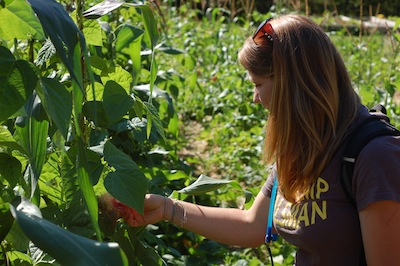By Joel Magalnick, Editor, JTNews
What’s in your garden? Are you willing to share what you’ve grown? As more studies emerge about the correlation between healthy eating and better performance in the workplace and classroom, food banks are beginning to make a more concerted effort to provide healthy produce and products for their clients. The Seattle area’s Jewish community has begun to join in.
With the opening of Jewish Family Service of Greater Seattle’s expanded food bank in 2010 and what it calls a “consumer-choice” model, its clients could choose items — including fresh produce — rather than accept a pre-stocked bag of non-perishable goods.
“We think it’s really important that people have access to healthy food,” said Jana Prothman, director of the JFS Polack Food Bank. “Most people on food stamps eat small amounts of fruit and vegetables.”
Now JFS has taken that idea a step further, adding partnerships with a number of fresh food producers to ensure its clients can eat more healthfully. On that list is the neighborhood farmers’ market, Oxbow Farm in Carnation, Congregation Beth Shalom’s garden, and several community gardens known as P-Patches.
“We want to spend locally where we can, and support local agriculture,” Prothman said.
JFS established its Food Bank Action Plan this year, which borrows from a similar effort released by the City of Seattle, by giving its clients “food that is fresh and nutritious and grown without harming its producers or our air, water, or soil,” according to the plan.
The plan’s goals are to go full circle in the lifecycle of fresh fruit and vegetables from supporting the farmers — preferably local — who grow them to ensuring that as little as possible goes to waste.
With the farmers’ market and P-Patches, the food bank is able to glean leftovers each week, sometimes bringing in as much as 400 pounds of produce. JFS generally goes through between 1,200 and 1,600 pounds of produce a week, Prothman said. The rest is purchased at discount from Oxbow or from local wholesalers, or provided by partnerships with Northwest Harvest and Food Lifeline, the region’s central food bank agencies.
For clients, many of whom have not previously had easy access to produce items, JFS has also partnered with local anti-poverty organization Solid Ground to provide healthy cooking classes.
“If people don’t know what to do, it doesn’t do any good,” Prothman said.
The number of people served by the JFS food bank has leveled off at approximately 1,300 households each month, but that number is still far above the 800 households it served prior to the 2008 recession. For homebound clients and older immigrants, Prothman said she doesn’t expect to see them come off the list.
People living close to the poverty line still come in for food, though not always as consistently as during the recession. That demographic is “not improving nearly as much in the middle to upper range,” she said.
JFS has long partnered with local day schools and the Jconnect young adults group to assist in tasks such as bagging rice or delivering food to clients, but the Union for Reform Judaism’s Camp Kalsman in Arlington is taking things a step further.
“Last year, at the end of summer, we realized the garden was going to be producing stuff even after we were gone, and we should, as ethical people and nice people, do something with the food instead of letting it rot on the vine,” said Camp Kalsman director David Berkman.
So they called up the nearby Everett Food Bank, which sent a team to glean more than 700 pounds from the camp’s gardens and dozens of fruit trees. This year, the camp staff formalized the program into a program they named 2 Tons Together, which combines food picked and donated from the camp’s gardens and a collection of non-perishables when parents pick up and drop off their kids. Due to timing and logistical challenges, the non-perishables will go to JFS while the fresh produce will go to the Everett Food Bank and the Kirkland branch of Hopelink, which helps families in crisis.
“Being a youth-friendly organization, we thought, “˜That might be a good place,’” Berkman said of Hopelink.
Close to 400 pounds of plums, squash and greens have been delivered already.
The camp was able to launch the farming program through a grant from the Samis Foundation, which helped to enable the purchase of tilling equipment, the drip irrigation system, and seed starts. Given that Kalsman is a camp, the harvesting has an educational component as well, in both gardening skills and charitable activities.
“It’s been really amazing to watch them grasp on to want to give to other people,” said Elizabeth Langevin, who manages the farm.
Langevin, who participated in the Urban Adamah Jewish farming program in Berkeley, Calif. before arriving at Kalsman last year, has integrated the Jewish laws surrounding agriculture and feeding the poor into the lessons for the campers who sign up for farming activities. This summer, the teenage campers took trips to Kirkland to volunteer at Hopelink.
“One of our core values at camp and one of the resonating core values of Judaism is about community, and ideally about kehillah kedosha, holy community,” Berkman said. “It is great for kids at an early age to learn that they have a responsibility not only to themselves and to be stewards of the earth, but to be responsible for other people in the community.”
But ultimately, Langevin said, the kids learn best when they’re having fun and feel a sense of accomplishment.
“They’re weeding, they’re staking tomatoes, they’re pruning, we had them mulch,” she said. And when they picked what they grew, “it was exciting for them to say, “˜We harvested this!’”
